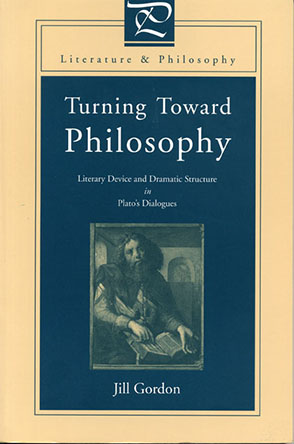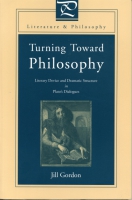
Turning Toward Philosophy
Literary Device and Dramatic Structure in Plato’s Dialogues
Jill Gordon
Turning Toward Philosophy
Literary Device and Dramatic Structure in Plato’s Dialogues
Jill Gordon
“In conclusion, I encourage serious students of Plato to read Turning Toward Philosophy. This positive and fundamental project is provocative and generally successful. It will happily turn the reader of Platonic dialogues to the philosophical significance of their literary features. It should not—I hope—turn them away from their arguments.”
- Description
- Reviews
- Bio
- Subjects
The picture of philosophical activity emerging from the dialogues, as thus interpreted, is a complex process involving vision, insight, and emotion basic to the human condition rather than a resort to pure reason as an escape from it. Since the literary features of Plato's writing are what draw the reader into philosophy, the book becomes an argument for the union of philosophy and literature—and against their disciplinary bifurcation—in the dialogues.
Gordon construes the relationship of Plato's text to its audience as an analogue of Socrates' relationship with his interlocutors in the dialogues, seeing both as fundamentally dialectic. On this insight she builds her detailed analysis of specific literary devices in chapters on dramatic form, character development, irony, and image-making (which includes myth, metaphor, and analogy).
In this way Gordon views Plato as not at all the enemy of the poets and image-makers that previous interpreters have depicted. Rather, Gordon concludes that Plato understands the power of words and images quite well. Since they, and not logico-deductive argumentation, are the appropriate means for engaging human beings, he uses them to great effect and with a sensitive understanding of human psychology, wary of their possible corrupting influences but ultimately willing to harness their power for philosophical ends.
“In conclusion, I encourage serious students of Plato to read Turning Toward Philosophy. This positive and fundamental project is provocative and generally successful. It will happily turn the reader of Platonic dialogues to the philosophical significance of their literary features. It should not—I hope—turn them away from their arguments.”
Jill Gordon is Associate Professor of Philosophy at Colby College
Mailing List
Subscribe to our mailing list and be notified about new titles, journals and catalogs.



